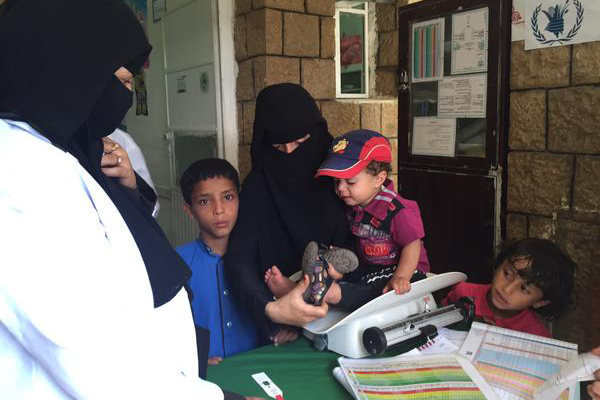WFP Warns Of Food Crisis In Yemen Amid Challenges In Reaching People And Shortage Of Funding

SANA’A/ADEN - Seeing first-hand the challenges facing millions of people affected by the crisis in Yemen, the UN World Food Programme (WFP) Executive Director Ertharin Cousin, warned that lack of immediate and unhindered access to people who urgently need food assistance and the shortage of funding create the possibility of famine for millions, mostly women and children already hungry in this war-torn country.
The conflict exacerbates the country’s extremely fragile food security situation. WFP estimates that the number of food insecure people in Yemen is now close to 13 million, including 6 million who are severely food insecure and in urgent need of external assistance – that is one in five of the country’s population.
“Right now, the conflict-driven convergence between the lack of staple food, access to clean water, and a diminished fuel supply create the dawn of a perfect storm for the most vulnerable Yemeni people,” said Ertharin Cousin, WFP Executive Director.
“The disruption in the commercial food sector creates significant reductions in imports which causes an inflationary effect on market prices for food and other basic commodities. As a result, we are starting to see a double effect of the conflict as even the people who could previously afford to meet their food needs are today unable to buy food.”
During a three-day visit, Cousin, travelled to Sana’a, Amran and Aden. She met with displaced families taking refuge in school buildings, mothers and their young malnourished children at health centres and hospitals, as well as families at food distribution sites. She also held meetings with the authorities on both sides of the frontlines, WFP staff, UN sister agencies and NGO partners.
More than 1.2 million children are suffering from moderate acute malnutrition and over half a million children are severely malnourished. “The damage to Yemen’s next generation may become irreversible if we don’t reach children quickly with the right food at the right time. We must act now before it is too late,” said Cousin.
The recent fighting around major ports will stall the commercial and humanitarian supplies to the country mainly food and fuel. Shortages of fuel are not only impacting the food distribution system of both the humanitarian and the private sector but will have a devastating effect on access to clean water, health, electricity and other basic services.
WFP has reached 3.5 million people with food since the beginning of the conflict but the fighting makes deliveries difficult and dangerous. Many road networks in the hardest hit areas of the country are still not operational, making communities in conflict-areas inaccessible for aid workers.
A recent vulnerability assessment conducted by WFP using mobile phone technology, reaching some of the households in areas inaccessible by teams on the ground, reflected that the deteriorating food security situation is particularly affecting the internally displaced families. Many families are existing on bread, rice and tea. The most common themes mentioned by the people interviewed for the assessment are “high food prices”, “shortages”, “lack of water” and a “deteriorating” situation.
The assessment showed that emergency food security conditions currently prevail in conflict-affected governorates. This phase is one step away from famine levels. Food insecurity is most severe for the country’s 1.3 million internally displaced people.
Shortage of drinking water is a critical issue. The price of water in Sana’a had tripled since the start of the conflict because pumping systems have been hit by the lack of diesel fuel. Water is critical for families to prepare food and has an impact on people keeping livestock, which is very important for livelihoods in the country.
An emergency operation planned to start in September is expected to cost some US$320 million for a period of six months. WFP implores the entire global community to recognize the urgency of the Yemeni crisis, with a specific call to those who have made commitments to expeditiously fulfil their pledges. WFP is grateful to the donors who have financially contributed or pledged support to the Yemen response including the European Commission (ECHO), Germany, the Kingdom of Saudi Arabia, the United Arab Emirates, the United Kingdom and the United States of America.
# # #
WFP is the world's largest humanitarian agency fighting hunger worldwide, delivering food in emergencies and working with communities to build resilience. Each year, WFP assists some 80 million people in around 80 countries.
Follow us on Twitter @wfp_media and @wfp_mena
View video from Aden and Sana’a here
For broadcast quality video download here
Download stills photos here
Read the latest WFP Food Security Bulletin here
For more information please contact: (email: firstname.lastname@wfp.org)
Abeer Etefa, WFP/Cairo, Mob. +201066634352
Dina El-Kassaby, WFP/Cairo, Mob. +2010 15218882
Reem Nada, WFP/Cairo, Mob. +20106663452
Jane Howard, WFP/Rome, Tel. +39 06 65132321, Mob. +39 346 7600521
Gregory Barrow, WFP/London, Tel. +44 20 72409001, Mob. +44 7968 008474
Bettina Luescher, WFP/Geneva, Tel. +41 22 917 8564, Mob. + 41-79-842-8057
Steve Taravella, WFP/Washington DC, Tel. +1 202 653 1149, Mob. +1 202 770 5993
